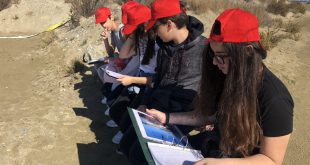
This one-day program includes the participation of students in a series of activities with theoretical and practical direction and is based on the pedagogical methodology of problem solving. It is organized in such way as to support the understanding of environmental concepts and issues by anchoring students in an exciting learning adventure for them.
- Mission: Students arrive on the Coast and are informed that as members of the “Department of Environmental Crimes Investigation” they are called upon to solve a crime involving the area. Solving the mystery requires students to go through different document collection stations, to evaluate testimonies by participating in various experiential activities.
- Creation of sand dunes: Students drawing information from scientific articles, tables of abiotic factors and study of specific life factors, know the ecosystem of dunes and study how to create and develop them through experimental and playful way.
- Food webs: Students, using the evidence they collect about the food relationships of Coastal organisms, discover the Food webs of the Coast. Thus, they delve deeper into the concepts of food relationships, while at the same time recognizing organisms in the area and their relationships with each other.
- The effect of garbage: Students study and discover various presumptions that are related to the time of decomposition of different waste and their effect on the Coastal ecosystem. Through the data they collect and activities related to their rate of deconstruction, students wake up environmentally and realize the effects that anthropogenic waste can have on natural ecosystems.
- The coast and the humans: Students identify and study various presumptions that are directly related to the presence of human on the Coast and the consequences of anthropogenic activities in the ecosystem. They explore and outline human’s relationship with the shores.
- Solving the Problem: The data collected and answered specific questions that help the students in solving the mystery unfolding on the Coast are processed. They understand the importance of sustainable coastal management and protection and develop environmentally friendly attitudes and values.
- Action: Students returning to their school are asked to continue their action at the individual and collective level (class, school, community) to protect the coasts.
 Κυπριακό Κέντρο Περιβαλλοντικής Έρευνας & Εκπαίδευσης – Κυκπεε
Κυπριακό Κέντρο Περιβαλλοντικής Έρευνας & Εκπαίδευσης – Κυκπεε



